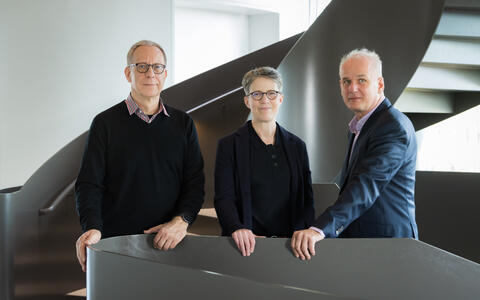ImmunoPreCept: “We want to shake up medicine”
What is the idea behind your cluster?
Siegmund: We want to shake up medicine.
That sounds ambitious.
Siegmund: It is. Currently, in medicine, we primarily think in terms of diseases and how to interrupt disease-driving pathways to treat a specific condition. In our view, that's the wrong approach. With ImmunoPreCept, we want to focus on the phase that precedes illness and ask: Why do we become ill in the first place?
You will focus on disease stages that may not yet show symptoms?
Rajewsky: Yes – and there is enormous need for this in a country with an aging population. Most chronic diseases develop over decades before becoming symptomatic. If we detect such diseases early, people can remain healthy longer.
Diefenbach: We want to find out what keeps us healthy – at the cellular and molecular levels – and fundamentally understand what protects people who don’t get sick. What makes them more resilient? Symptoms always mean that some damage has already occurred. We are investigating how we can act preventively or catch an illness at a very early stage.
What diseases will you focus on?
Siegmund: Chronic inflammatory diseases like rheumatoid arthritis or Crohn’s disease and cancers. In both, malfunctions of our immune system play a role. Fundamentally, we believe that immunological mechanisms are involved in many chronic diseases.
Hence the “Immuno” in the name. What does “PreCept” stand for?
Diefenbach: “Pre” stands for “prevention.” “Cept” comes from “interception” – the effort to catch diseases early, before severe symptoms even arise. To do that, we must look at the level of individual cells.
Rajewsky: A cell repeatedly refers to instructions in its genetic material. That’s how it knows how to respond to external influences. With single-cell technologies, we can observe these processes at a resolution unimaginable just ten years ago. The emergence of disease also involves the spatial relationships of cells within tissues – who is next to whom, who is communicating with whom? Immune cells are central to this. But we don’t want to stop there: We want to use AI models to predict disease progression and enable precise interventions.
You examine the transition between health and disease. How can such a complex topic be researched?
Siegmund: We have three core areas: First, we want to understand which molecular mechanisms contribute to maintaining health. Second, we focus on the specific interface between healthy and diseased – how disturbances in the immune system lead to illness. The third area deals with remission. These are resting phases in patients whose disease has been treated and is under control. But they are not healthy. We investigate how these remission phases differ from a truly healthy state and how they can be improved.
Diefenbach: This is supported by two cross-cutting programs. The first is a platform for immunophenotyping, together with the Deutschen Rheuma-Forschungszentrum (DRFZ) in Berlin – one of our central partners. The DRFZ is analyzing blood samples to identify patterns. This can, for example, predict whether patients at risk of developing rheumatoid arthritis will actually become ill.
Siegmund: The second cross-cutting program is a key element for us. We can research everything scientifically at a high level, but that’s not enough. We want to fundamentally revolutionize our understanding of health and spread this new mindset on a societal level as well.
You’re referring to the Berlin Forum for Science with Society, which you plan to establish. What is that about?
Rajewsky: It’s like a think tank consisting of experts, citizens, and political actors. We want to establish awareness of precision prevention and start incorporating societal perspectives. We want to reach people while they still feel healthy – that’s where prevention begins!
Your cluster is initially funded for seven years. Looking ahead, what will you have achieved ideally?
Siegmund: Three things: First, increased societal awareness and the development of ideas collectively. While our focus is on molecular prevention, we can already start more simply now: avoiding soft drinks, for example, could prevent a lot of harm. Second, in seven years, we aim to identify at-risk individuals within a healthy population and develop measures to prevent them from becoming ill. Third, we want to be internationally recognized as a research consortium in this field.
What is the significance of your cluster for Berlin as a science hub?
Diefenbach: A new research building focused on precisely this topic – “The Healthy Human” – is already being developed at Charité Campus Benjamin Franklin. We want to enable encounters, gatherings, and discussions there, also for Berlin’s citizens.
Rajewsky: To cure diseases, you must first understand what’s happening inside cells. Rudolf Virchow once postulated this. We now have the technical means to make Virchow’s dream come true – right here in Berlin. We want to redefine precision prevention and become a driving force in this field – in Berlin, in Germany, and worldwide.
Andreas Diefenbach, Britta Siegmund and Nikolaus Rajewsky on the spiral staircase in the MDC-BIMSB
The coordinators
Andreas Diefenbach is Director of the Institute of Microbiology and Infection Immunology at Charité – Universitätsmedizin Berlin and Einstein Professor of Microbiology.
Britta Siegmund is Professor and Director of the Medical Clinic for Gastroenterology, Infectiology and Rheumatology at Charité.
Nikolaus Rajewsky is Director of the Berlin Institute for Medical Systems Biology of the Max Delbrück Center (MDC-BIMSB) and Professor at Charité.
Interview: Julia Drews, Charité. This interview first appeared in a Tagesspiegel supplement.






